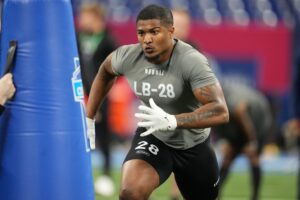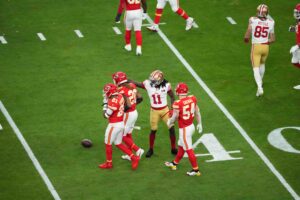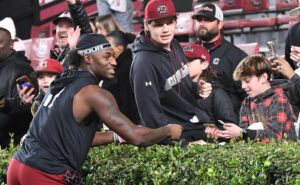Landon Collins doesn’t like his new position too much, but it’s made him the undisputed star of the Washington Football Team defense. The safety turned box linebacker cemented his growing status during Monday night’s 17-15 win over the Seattle Seahawks. Collins finished the game with seven combined tackles, including five solo stops and a tackle for loss. He also forced a fumble and helped Kamren Curl sack Russell Wilson.
The all-action performance has become typical for a player who has fit uncomfortably into a new, hybrid role:
Landon Collins says of his new role — the Buffalo nickel; a LB/S hybrid "I'm still not thrilled about it, but regardless of wherever they put me I'll make the best of my opportunity. I'm a team player. As long as we're wining and helping the team, I'm good with that."
— John Keim (@john_keim) November 30, 2021
Landon Collins Thriving in New Role for Washington Football Team
There was a vacancy atop the billing for the WFT defense after Chase Young was lost for the season to a knee injury. The second-year defensive end wasn’t exactly pulling up trees, but he had still become the face of a unit that initially disappointed this season. That’s changed the last three games, all wins, when Washington has allowed 19, 21 and 15 points against the Tampa Bay Buccaneers, Carolina Panthers and Seahawks, respectively.
Turning Collins loose is a big reason for the sudden stingy streak. Defensive coordinator Jack Del Rio is using Collins as a downhill, seek-and-destroy missile to wreck both phases of an offense. That includes run blitzes like the one that dropped Alex Collins on Monday Night Football:
Landon Collins brings Alex Collins down in the back field.
Great burst off the edge from #26.#WashingtonFootball pic.twitter.com/nZoVg5lv5x
— Chad Ryan (@ChadwikoTWW) November 30, 2021
It also includes putting pressure on the passer, like when Collins and Curl rushed the inside gaps to get to Wilson:
Kam Curl and Landon Collins combine for the huge sack on 3rd down!#WashingtonFootball pic.twitter.com/kSnaRy2ka2
— Chad Ryan (@ChadwikoTWW) November 30, 2021
The increased chances to make splash plays have transformed Collins’ confidence. He resembles the player named an All-Pro with Washington’s NFC East rival, the New York Giants in 2016. His numbers reflect how clearly the 27-year-old has his swagger back. Week 12 was the fifth game out of six when Collins was in on at least five tackles.
More than the numbers, Collins is playing with the kind of belief that makes him feel anything is possible. He now thinks he can impact a game at any moment, like when he punched the ball loose from Collins’ grasp for a critical turnover:
Landon Collins with the peanut punch to force the fumble ‼️ pic.twitter.com/QgJFhxZ5hn
— NFL on ESPN (@ESPNNFL) November 30, 2021
Defensive players try this stuff all the time, but it rarely works. Things like this go your way when you’re playing as well as Collins has this season. He’s provided the momentum-shifting plays Del Rio must have thought his unit had lost with pass-rushers Young and Montez Sweat on the shelf.
What is Old is New Again
There’s a certain irony about Collins not liking his new safety/linebacker dual role, the way he expressed it to ESPN’s John Keim:
But do I like playing down there? I’m good at it. Of course. If I’m good at it, I’ll play there if I need to be played there. Other than that, do I like playing linebacker? No. I don’t like hitting big linemen and getting big linemen off me. I’m undersized for being a linebacker.
Honestly, it’s not new at all for a player who made his name as a box defender. Here are analysts from Pro Football Focus discussing where Collins played best before he joined Washington in 2019:
Prototypical Big Nickel/Dime LB ➡️ Landon Collins
See the full video🖥️: https://t.co/0BWvxnxiMC pic.twitter.com/EqaTnjtrev
— PFF Commanders (@PFF_Washington) June 5, 2019
Shades of a ’90s Great
There is a lineage to this type of position. Fritz Shurmur made it popular during the 1990s through his creative use of hard-hitting safety Leroy Butler. He often played linebacker to provide run support, blitz the pocket, or mug inside receivers. Butler became the staple of some outstanding Green Bay Packers defenses, including the unit that allowed the fewest yards and points in 1996, en route to winning Super Bowl XXXI.
ESPN’s Rob Demovsky described in 2014 one way Shurmur expanded Butler’s responsibilities:
After a crushing 38-27 loss to the Cowboys in the NFC Championship game, Shurmur called Butler to the front of the plane, where the coaches sat. On a napkin, he scribbled a new formation that he would call the ‘smoke’ defense — an eight-man front featuring Butler as a blitzing safety — he wanted to install for the 1996 season.
Shurmur saw the benefit of having a player who could move around formations and confuse offenses, according to Gil Martin of the Sports Daily:
Fritz Shurmur, who was Green Bay’s defensive coordinator during Butler’s prime recalled in the Packers 1997 Yearbook that Butler had ‘great instinctive feel for the ball. Gives us an opportunity for a lot of flexibility in our defense, with his ability to blitz, to rush the passer. A very smart, innovative guy, a leader.’
Collins is equipping Washington’s defense with the same unpredictability.
[pickup_prop id=”15276″]
Still a Safety at Heart
Collins isn’t putting up Butler-level numbers, but there are more similarities between the two than meets the eye. Shurmur’s Packer defenses most often played a three-safety, ‘Big Nickel’ set. Del Rio is doing something similar with Collins, Curl and Bobby McCain. It’s telling to note how Washington’s defensive assistants, including linebackers coach Steve Russ, still view Collins’ role in this scheme:
LB coach Steve Russ on Landon Collins's position: "He's not a linebacker. We deploy a three-safety set. … He's a safety."
— Ben Standig (@BenStandig) November 12, 2021
Collins’ ability to rotate down into the box or cheat back into coverage before the snap alters the picture for opposing quarterbacks trying to decipher Washington’s defense. Being able to handle this Chameleon-like role is no easy task and that’s why Del Rio’s unit misses Collins so much when he’s not on the field.
His absence was particularly notable when Wilson burned the secondary for a 32-yard touchdown pass to Freddie Swain in the fourth quarter. Deshazor Everett replaced Collins and needed to carry the inside receiver vertically, like a middle linebacker playing Tampa 2, between the safeties playing Cover 2 behind him. Everett’s confusion let Swain run free with disastrous results:
This was such a big mistake by Everett, in fo the injured Landon Collins. Hole player in Tampa-2, has to carry the 3rd receiver up the seam, didn't, and it was left wide open for the touchdown. pic.twitter.com/Ep2w43PCoX
— Mark Bullock (@MarkBullockNFL) November 30, 2021
There is no stronger indication of Collins’ star status than the defense breaking down without him.
Playing Linebacker Has Saved Landon Collins
Collins likely wouldn’t still have a career in Washington if he hadn’t moved out of his comfort zone. Many, including NFL.com’s Gregg Rosenthal, earmarked Collins as a candidate to be cut last off-season. It made sense after injuries derailed Collins following his $84 million move from the Giants.
He missed 10 games during two years, and hardly impressed when he did see the field. Those struggles, combined with a bumper contract set to pay Collins $11.5 million, $12.5 million and $13.5 million during the next three years, made him a prime candidate to be released. Collins eventually stayed put, but rumors he might leave didn’t go away. He was on the trade block in November, according to Ben Standig of The Athletic.
Head coach Ron Rivera is lucky the front office didn’t find a trade partner willing to absorb Collins’ hefty salary. Collins has redefined a struggling defense and lent more flexibility to the playbook. He’s as important as quarterback Taylor Heinicke and defensive tackle Jonathan Allen for Washington’s playoff hopes.
Main photo:
Embed from Getty Images






